Stanley Nelson Gordon Giddings
Serjeant 14341 Stanley Nelson Gordon Giddings, 8th Battalion, Royal Berkshire Regiment

9 Jubilee Road, when the Giddings family lived here it was 1 Primrose Cottages |
Stanley was born in Upavon, Wiltshire in 1895 the son of Levi Giddings and his wife Sarah Jane née Stephens. He had four siblings: Edith Blanche (born 1880), Howard Bertie T (1886), Ellen Jane (1890) and Dorothy Daisy Mildred (1897). All the children were born in Upavon where Levi ran a coal merchant’s business. In 1906 the family (minus the two eldest children) moved to Primrose Cottages, Jubilee Road, Newbury, where Levi earned a living as a house painter working for a local builder. At some point between 1901 and this move it seems that the coal merchant’s business failed and Levi was forced to look elsewhere for an income – though it is also possible that he sold the business in order to work in a less physically demanding job. Stanley also found work in Newbury, as a porter for the Great Western Railway at Newbury Station. In 1911 they moved again, to Winchcombe Terrace, King’s Road - nearer the town centre but not as good housing as they left in Jubilee Road. This terrace was demolished in the 1960 to make way for a relief road, now the A339.
When war was declared on 4 August 1914 it did not take Stanley long to decide what to do – he enlisted into the local infantry – the Royal Berkshire Regiment – in September 1914. As one of the huge number of so-called Kitchener recruits he was allocated to the newly formed 8th Battalion of the regiment, then taking shape at the Codford Training Centre in Wiltshire. He evidently did well during training and was promoted to the rank of Signalling Corporal.
On 7 August 1915 the battalion crossed the Channel to France where they became a part of 2nd Brigade in the 1st Division. This was a battle hardened/weary regular division that had just lost several Guards battalions to the newly formed Guards Division – the men of the Service battalions arriving to take the place of the elite Guards units probably felt they must have impressed their senior commanders in order to be chosen for this duty. Their new divisional commanders were probably less impressed! Nevertheless they were soon in the thick of the fighting during the Battle of Loos, chosen to spearhead the attack in 1st Division’s sector. Stanley wrote home telling of his experiences during the battle (during which he was promoted to Sergeant):
Reading Mercury, 30 October1915 - War Stories – The 8th Royal Berks
The following interesting letters written by Sergeant S Giddings (14341), 8th Battalion Royal Berkshire Regiment (whose home is at 4, Winchcombe Terrace, King’s Road, Newbury), tell of two attacks his regiment made on the German trenches. He also refers to the gallant behaviour of two of the officers, one of whom lay on the ground firing his revolver at the enemy after he had received a wound from which he died, and another who was riddled with bullets whilst leading an attack. He says:-
“We had a go at the Germans in the recent big advance. After three days’ marching we entered the trenches on the Thursday night, and, of course, we knew that in the near future we were to attack the Huns. Our artillery was constantly bombarding the Germans, and they sent us some back in return. On Friday night sleep was very scarce, as we were preparing to attack at 6.30am on the Saturday. We were all standing to arms, and the appointed men commenced to advance. The artillery was playing rapid fire on the enemy trenches, and the Germans were sending over a heavy fire, both shrapnel and machine-gun, and we lost a lot of men. The Germans seem to rely a great deal on their machine-guns.
“I was in the second line, being in charge of some signallers, we reeled out our telephone wire. I saw one poor fellow waving his hand after we had gone some distance, and when I got to him I found that he had had his leg broken above the knee by shrapnel. I called to two men of another regiment, and we lifted him on to a blanket and took him back to the trenches. This was a risky job, for we were under heavy rifle fire and bursting shrapnel.
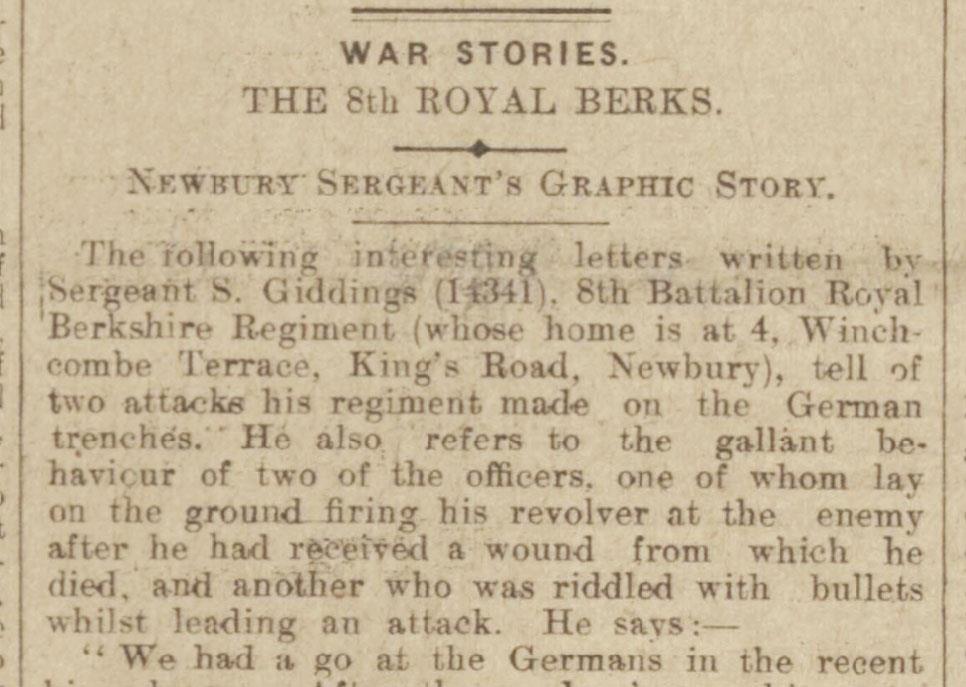
Reading Mercury report of Stanley's letters. |
“I started off again and caught my men, but we missed our battalion. On finding out the direction in which they had gone we started off again, but had not gone far before we found that a sniper was having a pot at us. So we lay low for a time, and then crept about 300 yards on our stomachs. I thought we had dodged him, but on standing up to make a bolt for it I found out my mistake. As we were running one of the men was shot in the right shoulder. A bullet went clean through his mess tin, which was on his back, and into his shoulder, lodging there. I bound him up as best I could under the circumstances and then had to lie there until dark before he could get back to the dressing station.
“During the time I was dressing my mate’s wound the other fellow had a bullet hit his ammunition pouch, but luckily the shot did not explode any of the cartridges. We crawled away again until we got to the trenches our men had captured. We got it hot from shell fire the whole time, and during the night we stood to arms, expecting the enemy to counter-attack, but they did not come.
“The Germans are ‘dirty’ fighters. They run away or give themselves up rather than fight to the last, and fire on our wounded and the men who collect and bury the dead. We were relieved after four days in the trenches, and we were glad to get out of range of the big guns.”
Writing under date October 17th Sergeant Giddings says: “We are now billeted in a nice large town, about 15 miles from the firing line. It is a fine place, quite as big as Reading, and with just as large shops, which sell articles of every description. We had our second ‘flick’ at the Germans last Tuesday. We had been in the trenches for seven or eight days before we made the attack. This was only our second time in the trenches, and on each occasion it has been pretty warm. There was continual bombardment, and the Germans never failed to answer with shrapnel or ‘Jack Johnsons.’
“We had our rum issued in the morning, and then, after a little meal (called dinner in civil life) we were ordered to put on our gas helmets. Some smoke bombs were thrown well out over the parapet of the trenches, and then, after a few minutes interval, the first line advanced. Each man carried a pick and shovel, so that he could commence to consolidate the first German trench immediately they got there. This line advanced well, and the got from 50 to 80 yards without a man falling. Then the Germans in the first line trenches began pouring machine-gun fire into them, and they had to lay low. A good many were killed, but the greater proportion were wounded.
“I saw one of our officers who had been wounded in the throat (and afterwards died from it) lying down peppering the ‘Germs’ with a few revolver ‘pillets.’ He did good work, and I know that all the boys of his company were very sorry to lose him. Another officer – a captain – was walking up the trench his company occupied and was heard to say ‘Will you follow me, boys?’ The men answered with one voice, ‘We will follow you anywhere, sir.’ The next minute they were over the parapet, and rushing towards the German lines. But the poor officer did not get 50 yards before he was riddled with machine-gun bullets. It put the devil into the men to see their Captain fall, and they went for it with the determination to kill the Huns or die themselves in the attempt.”
The same letters were reported in the Local War Notes column of Newbury Weekly News on 4 November 1915, which added a little more information about Stanley: ... Sergt Giddings joined in September 1914, being then employed at Newbury Railway Station. He is a son of Mr and Mrs L Giddings, 4, Winchcombe Terrace, King’s-road, Newbury. ...
Interestingly some of Stanley’s story was also told in a letter from his wounded mate, William Arthur Ayres:
Reading Mercury, 9 October 1915 – Reading Soldiers Stories
Signaller W A Ayres, son of Mr W R Ayres, 9, St Edward’s Road, Reading, who was wounded in the great attack on September 25, is now in hospital at Warrington, Lancashire. Previous to enlisting, Signaller W A Ayres was employed at the GWR Signal Works. He was educated at Wokingham Road School. Writing to his parents, Signaller W A Ayres tells this graphic story:-
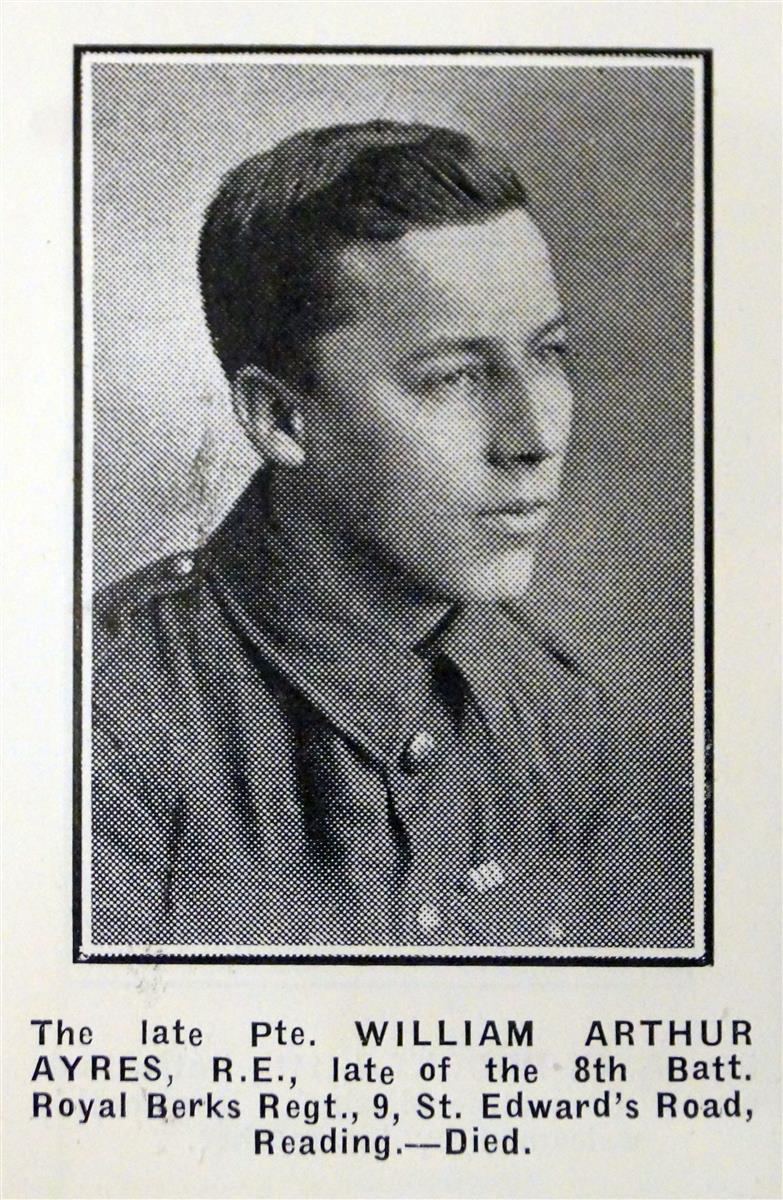
|
“Now for a bit of history. On Saturday morning the ‘Stand to’ cam round about 5.20, and also the rum, of which I did not partake. [Ayres os a member of the GWR Temperance Union.] I had had two biscuits on the previous day, but owing to us losing ten men getting up rations, we had little or no food, and water was exceedingly precious. At 6.20 the men charged under an awful machine-gun and shrapnel fire. When they had taken the first line we ran across with the live wire . . . . We had captured three lines, most of the enemy not waiting for bayonets. We signallers had two wires across to the almost captured village (or town) of _____, and one had been broken. Myself, Corporal Giddings and Shirley, took another wire across. We were within sight of the village, and they were trying to stop us three chaps with a quick-firing gun. The shells did not hit, but a sniper did, and put one through my shoulder, mess can, coat and everything. Mt two mates dropped down and put a field dressing on my wound and then ran on, and I believe they got the wire across. I lay low until the sniper in the trees had wasted most of his ammunition, and then I made a bolt for it and got to the field dressing station.”
Signaller Ayres, speaking of the hospital where he now is, says:-
“This place is A1, and plenty to eat.”
William Ayres recovered from his wound and returned to the front. In August 1916 he was wounded again, earning a Military Medal for his gallantry. This time his wounds meant he was no longer fit for the infantry and, on 17 March 1917, he transferred to work on the canals in the Inland Waterway section of the Royal Engineers. For some this meant a safe occupation on the waterways of England, but not for William - he back to France to work on the canals there. He died in a hospital at Merville on 22 July 1917. The cause of his death is unknown, but, when his picture (above) appeared in the Reading Standard, the 'cause' of death given (died) is suggestive of death from sickness.
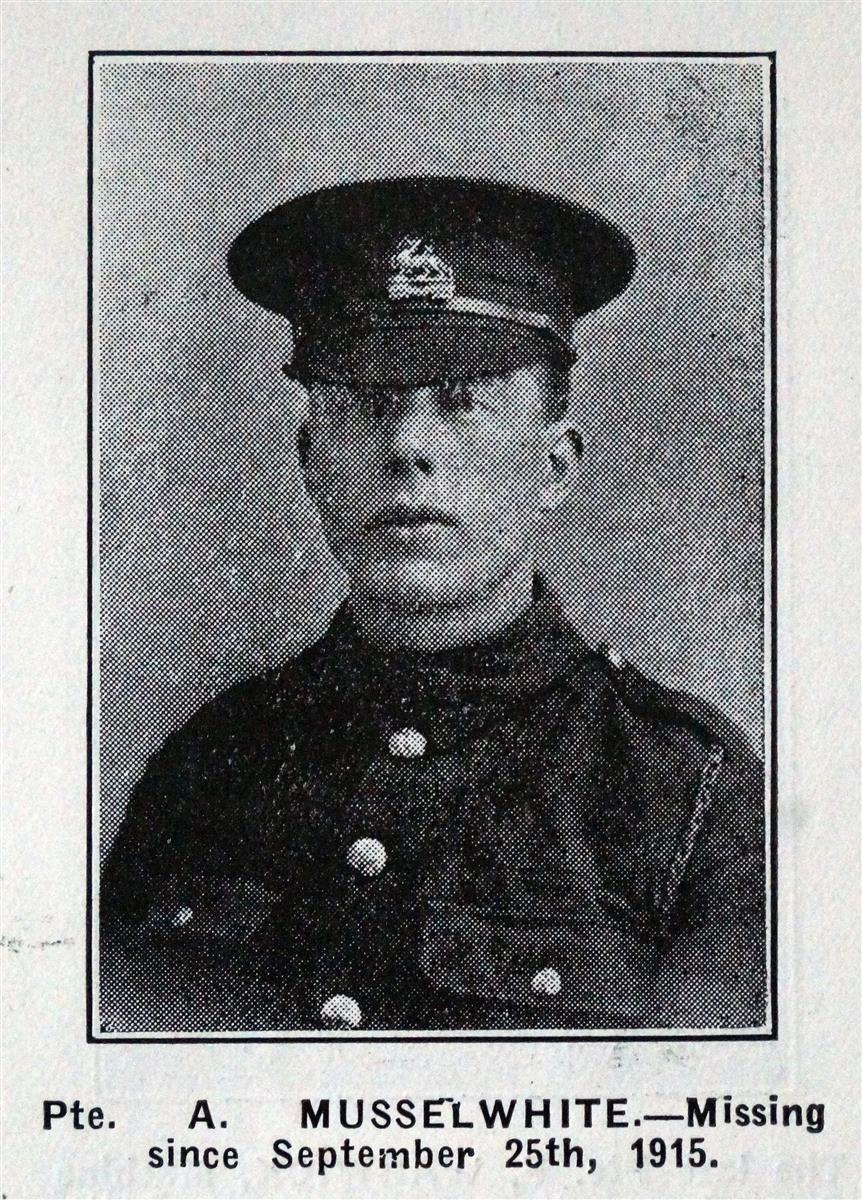
|
Stanley also wrote in response to an appeal by the parents of Arthur Musselwhite, who had been reported missing:
Reading Mercury, 11 November 1915
Mr Musselwhite received the folowing letter from Sergeant Giddings, Theyton Towers, Hospital, Theyton Bois, Essex. - It is with deep regret that I have to inform you that your son was shot in the back. As he called to me saying that he was hit, I told him to get into the trench out of the way of the shells, and bullets, that were dropping in all directions. One of my signallers stopped and helped him to shelter, and all I can say is that he was very badly hit but I can assure you that he is not a prisoner of war. This is all the information that I can give you as I was hit myself shortly afterwards at about 7.30.a.m. on September 25th.
While on leave in 1916 Stanley married Elsie Annie Andrews; the newly-weds found lodgings at "Penshurst," West Street, Newbury. Their time together was short, in a matter of days Stanley would have returned to his unit in France.
In February 1918 there was a major reorganisation of the British Expeditionary Force on the Western front. Lack of men meant that many battalions were woefully short of complement. It was decided to reduce infantry brigades from four battalions each to three and to disband many battalions and use their men to bolster the strength of the remaining units. In this exercise the 8th Royal Berks were moved from 1st Division to the 18th Division, taking the place of the 6th Royal Berks in the 53rd Brigade (and taking on many of the men from the 6th Battalion, which was disbanded at this time).
Their new division was a part of 5th Army, commanded by General Hubert Gough, and responsible for a section of the front facing the Hindenburg Line around St Quentin. On 20th March the battalion was warned of an impending German attack on their positions. When the attack came it was overwhelming. The 8th Battalion was in reserve, manning strongpoints some 1500 yards behind the front line, within the so-called ‘battle zone’. The new defensive theory was to have relatively few men manning the front line, who would be expected to give way fairly quickly in the face of a determined attack – the attackers would then be drawn into the battle-zone where cleverly sited strongpoints would wreak devastation on them with overlapping zones of fire from their machine guns. Sadly, while the idea was sound, at this date the implementation rarely was; the defences were often incomplete and undermanned. When the Germans attacked the 8th Battalion was sent forward to help the defenders of the forward lines, probably not the best idea under the circumstances.
The 5th Army was facing a huge German offensive and almost broke under the strain, in the next few days they were pushed back up to 30 miles, almost to Amiens. To their south 3rd Army fared somewhat better, but there were moments when it seemed that the Germans were unstoppable.
Some idea of the first day of the offensive, as experienced by the 8th Royal Berks can be gained from the following short extract from John Chapman’s online History of the Biscuit Boys:
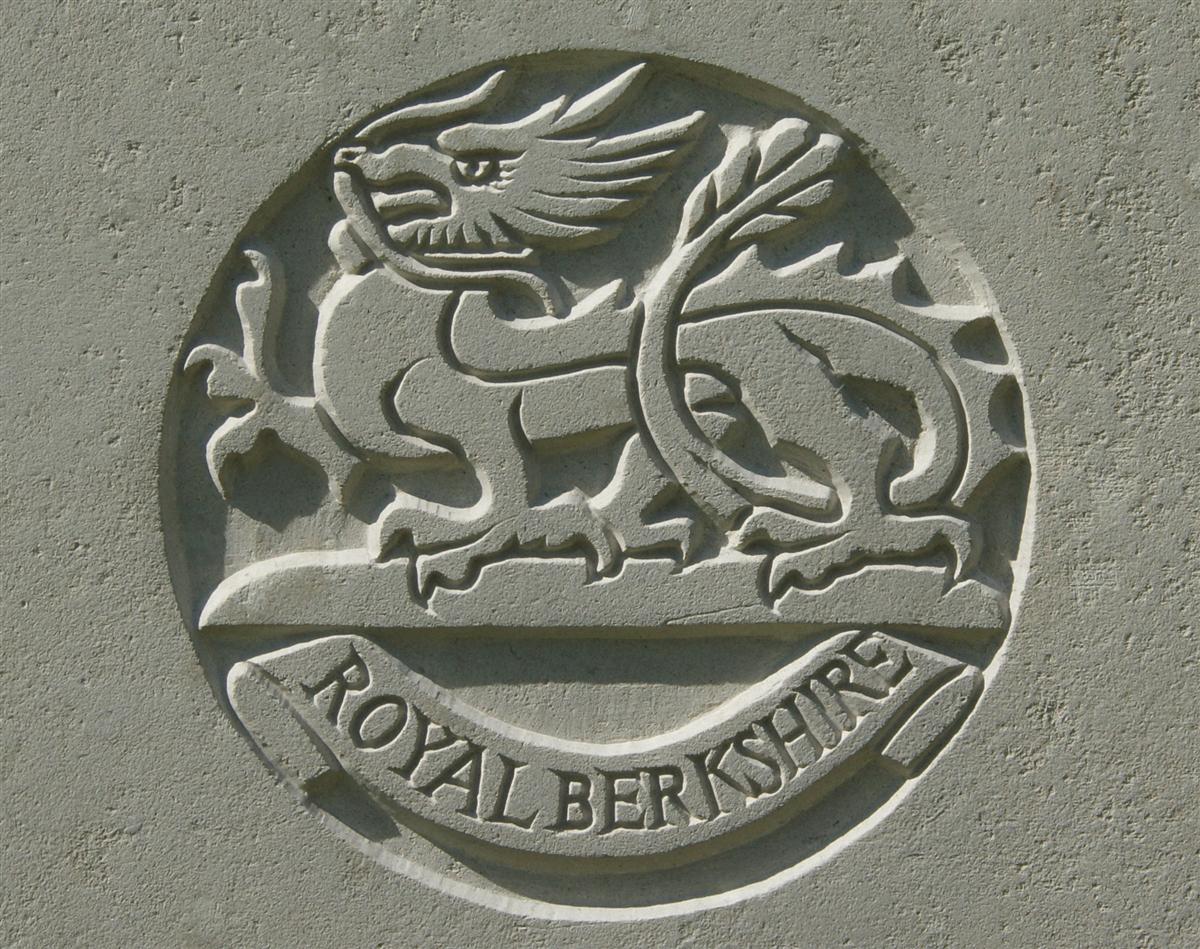
The regimental badge of the Berkshire Regiment, as used on CWGC headstones. |
When the mist cleared, the remainder of the battalion found themselves surrounded and Col. Dewey ordered them to withdraw down Seine Alley, a communication trench leading from the Forward to the Battle Zone. The Battalion now numbered only 182 men, the rest having been killed or captured in the Forward Zone. The withdrawal was covered by CSM J Orsford and a group of men who led the bombers forward up the trench down which the others were passing. Major D Tosetti MC and Lt. SAG Harvey led a party down Seine Alley to clear the Germans out of the rear of C Company’s trench. Major Tosetti was killed attempting to silence an enemy machine gun which threatened to hold up the retirement. Lt Harvey was also killed when he encountered a German officer face to face. Both men fired simultaneously and both fell dead.
The survivors, now under the temporary command of Sgt WJ Spokes, carried on a running fight with the enemy down Seine Alley and reached the Battle Zone about 1330 where they joined men of the 10th Essex in manning the defences.
Sergeant Spokes was not in command of the battalion for long, but the fact that he was in command at all speaks volumes about the losses experienced that day.
For much more on the 8th Battalion’s exploits during the German Spring Offensive see The Biscuit Boys The Spring Offensives - 8th Battalion
The Battalion’s final involvement was in the Defence of Amiens as the offensive finally petered out (to be renewed further north in the Battle of the Lys). This was on 4 April 1918, three days before Stanley died of his wounds at a Casualty Clearing Station (either the 5th or the 46th CCS) at Picquigny. It is not known where, when or how Stanley was wounded, it could have been at any time during this chaotic period, though his presence in a CCS suggests it was in the latter stages as he was more likely to have been moved on to a General Hospital in France, or back to the UK if he had been wounded in the earlier part of the fighting. The newspaper report of his death suggests that he may well have been wounded during the last day of the serious fighting, on 4 April.
Newbury Weekly News, 25 April 1918 – Local War Notes
Sergt S N G Giddings, Royal Berks Regt, died at a Casualty Clearing Station in France, on April 7th, as a result of wounds received in action. Sergt Giddings joined Lord Kitchener’s Army on September 7th, 1914, and went to France as a Corporal with his Battalion on August 7th, 1915, being promoted to Signalling Sergeant for good service. Although he served through most of the important actions that have been fought since he went to France, Sergt Giddings came through safely. His battalion was in the line when the Germans commenced their great offensive on March 21st, and he fought through the first days of the action when the enemy forced our men back by sheer weight of numbers. It was not until the enemy was practically held that he received the wound to which he succumbed. His parents (Mr and Mrs L Giddings) live at King’s-road, and his widow and child at “Penshurst”, West-street. Before joining the Army Sergt Giddings worked at the Newbury GWR Station, and his genial disposition won for him many friends. He was well liked in his battalion too, as is evidenced by the letters that have been received from France.
Stanley was buried in grave G. 9. at Picquigny British Cemetery, his wife, Elsie, chose the following words for his epitaph: Tis but a little while and we shall meet again.
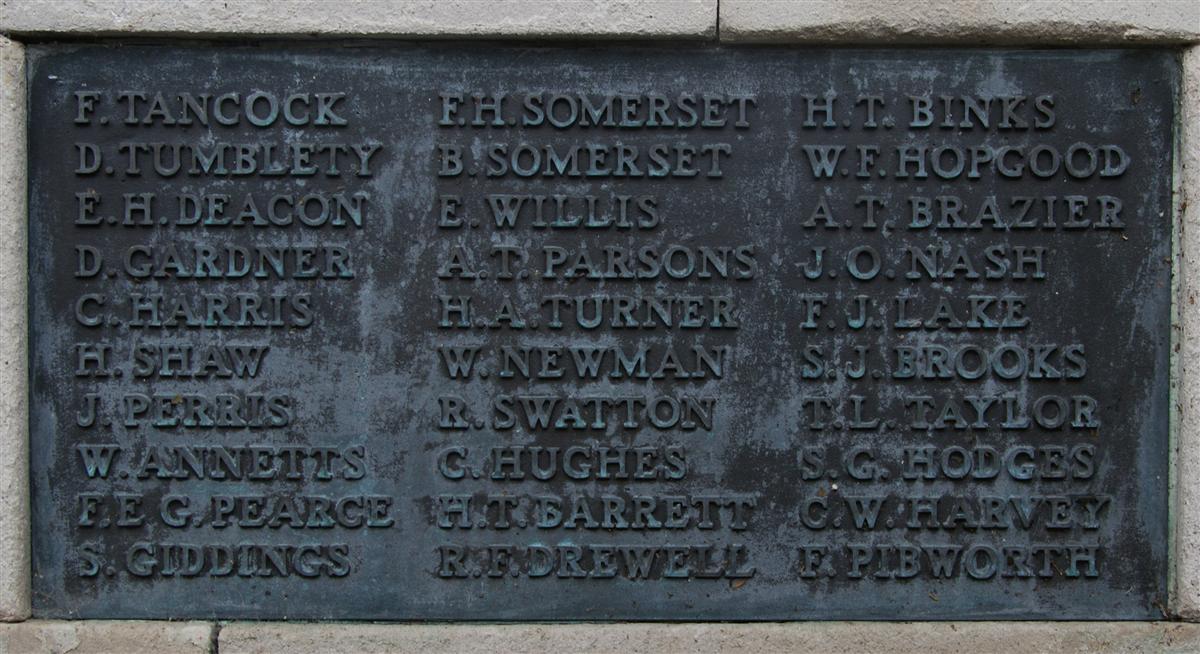
Stanley's name on Newbury War Memorial. (bottom-left) |
Locally Stanley is remembered on tablet 13 of the Newbury Town War Memorial and the parish memorial board and roll of honour in St Nicolas’ Church, Newbury.
Elsewhere his name is remembered on the Great Western Railway Roll of Honour; this was a printed memorial containing the names of 2,524 employees of the company who died as a result of their war service. Many copies of the memorial were framed and placed in stations all over the country; copies are known to be at Bristol Temple Meads, Chester, Exeter, Newton Abbott, Rosslare and Taunton stations, the National Railway Museum, Dean Forest Railway/ GWR Museum and Didcot Railway Centre; reproductions can be seen at Birmingham Moor Street and Leamington Spa stations.
Stanley's widow, Elsie, remarried in 1927 to Percival Taylor.

Find a memorial :
| Died this day: | |
| 02 March 1917 | |
| F L Hughes | |
| Yattendon |

Like this site? Show your appreciation through a donation to a great charity.